Related Research Articles

A bathroom, restroom or washroom is a room, typically in a home or other residential building, that contains either a bathtub or a shower. The inclusion of a wash basin is common. In some parts of the world e.g. India, a toilet is typically included in the bathroom; in others, the toilet is typically given a dedicated room separate from the one allocated for personal hygiene activities. In the United States, the word 'bathroom' is often used to refer to any room that contains a toilet, regardless of the inclusion of a bath or shower.

A bidet is a bowl or receptacle designed to be sat upon in order to wash one's genitalia, perineum, inner buttocks, and anus. The modern variety has a plumbed-in water supply and a drainage opening, and is thus a plumbing fixture subject to local hygiene regulations. The bidet is designed to promote personal hygiene and is used after defecation, and before and after sexual intercourse. It can also be used to wash feet, with or without filling it up with water. In several European countries, a bidet is now required by law to be present in every bathroom containing a toilet bowl. It was originally located in the bedroom, near the chamber-pot and the marital bed, but in modern times is located near the toilet bowl in the bathroom. Fixtures that combine a toilet seat with a washing facility include the electronic bidet.
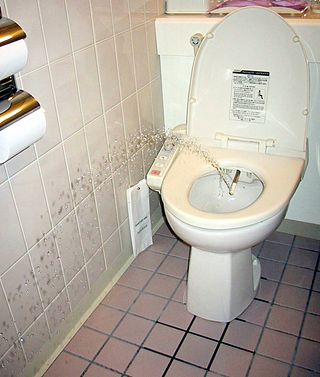
Toilets in Japan are sometimes designed more elaborately than toilets commonly seen in other developed nations. European toilets occasionally have a separate bidet whilst Japan combines an electronic bidet with the toilet. The current state of the art for Western-style toilets in Japan is the bidet toilet, which as of March 2016 is installed in 81% of Japanese households. In Japan, these bidets are commonly called washlets, a brand name of Toto Ltd., and they may include many advanced features rarely seen outside of Asia. The basic feature set commonly found on washlets consists of anal hygiene, bidet washing, seat warming, and deodorization.
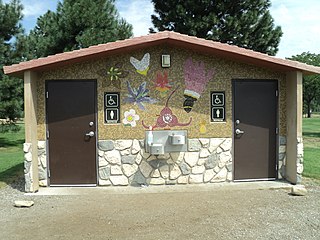
A public toilet, restroom, public bathroom or washroom is a room or small building with toilets and sinks for use by the general public. The facilities are available to customers, travelers, employees of a business, school pupils and prisoners and are commonly separated into male and female toilets, although some are unisex, especially for small or single-occupancy public toilets.

The 2005 Quran desecration controversy began when Newsweek's April 30, 2005, issue contained a report asserting that United States prison guards or interrogators had deliberately damaged a copy of the Quran. A week later, The New Yorker reported the words of Pakistani politician Imran Khan: "This is what the U.S. is doing—desecrating the Quran." This incident caused upset in parts of the Muslim world.

A garbage disposal unit (also known as a waste disposal unit, food waste disposer (FWD), in-sink macerator, garbage disposer, or garburator) is a device, usually electrically powered, installed under a kitchen sink between the sink's drain and the trap. The device shreds food waste into pieces small enough—generally less than 2 mm (0.079 in) in diameter—to pass through plumbing.

Joint Task Force Guantanamo (JTF-GTMO) is a U.S. military joint task force based at Guantanamo Bay Naval Base, Guantánamo Bay, Cuba on the southeastern end of the base. JTF-GTMO falls under US Southern Command. Since January 2002 the command has operated the Guantanamo Bay detention camps Camp X-Ray and its successors Camp Delta, Camp V, and Camp Echo, where detained prisoners are held who have been captured in the war in Afghanistan and elsewhere since the September 11, 2001 attacks. From the command's founding in 2002 to early 2022, the detainee population has been reduced from 779 to 37. As of October 21, 2022, the unit is under the command of U.S. Army Brigadier General Scott W. Hiipakka.
Bisher Amin Khalil Al-Rawi is an Iraqi citizen, who became a resident of the United Kingdom in the 1980s. Arrested in Gambia on a business trip in November 2002, he was transferred to United States military custody and held until 30 March 2007, in extrajudicial detention in the United States Guantanamo Bay detention camp at its naval base in Cuba. His Guantanamo Internment Serial Number was 906. The Department of Defense reports that Al Rawi was born on 23 December 1960, in Baghdad, Iraq.

Pul-e-Charkhi Prison, also known as the Afghan National Detention Facility, is a maximum security prison located next to the Ahmad Shah Baba Mina neighborhood in the eastern part of Kabul, Afghanistan. It has the capacity to house between 5,000 and 14,000 inmates, but as of February 2023 it only has between 2,000 and 2,500 inmates, most of whom have been arrested and convicted within the jurisdiction of Kabul Province. It is considered the country's largest prison.
The Guantanamo Bay detention camp is a United States military prison within the Guantanamo Bay Naval Base, also referred to as Gitmo, on the coast of Guantánamo Bay in Cuba. As of March 2022, of the 780 people detained there since January 2002 when the military prison first opened after the September 11 attacks, 741 had been transferred elsewhere, 30 remained there, and 9 had died while in custody.

Muhammad Ali Abdallah Muhammad Bwazir is a citizen of Yemen, once held in extrajudicial detention in the United States Guantanamo Bay detainment camps, in Cuba. Bwazir's Guantanamo Internment Serial Number was 440. American intelligence analysts estimate he was born in 1980, in Hawra', Yemen.

Camp 1391 or Unit 1391 or Facility 1391 is an Israel Defense Forces prison camp in northern Israel for "high-risk" prisoners. It is run by Unit 504. The existence of the prison was unknown to the public before 2003, and most information about it remains classified, though Israel's supreme court ordered the release of some information about the jail.
In United States law, habeas corpus is a recourse challenging the reasons or conditions of a person's detention under color of law. The Guantanamo Bay detention camp is a United States military prison located within Guantanamo Bay Naval Base. A persistent standard of indefinite detention without trial and incidents of torture led the operations of the Guantanamo Bay detention camp to be challenged internationally as an affront to international, and challenged domestically as a violation of the Due Process Clause of the Fifth and Fourteenth amendments of the United States Constitution, including the right of petition for habeas corpus. In 19 February 2002, Guantanamo detainees petitioned in federal court for a writ of habeas corpus to review the legality of their detention.
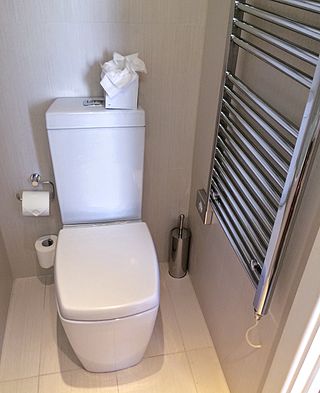
A toilet is a piece of sanitary hardware that collects human urine and feces, and sometimes toilet paper, usually for disposal. Flush toilets use water, while dry or non-flush toilets do not. They can be designed for a sitting position popular in Europe and North America with a toilet seat, with additional considerations for those with disabilities, or for a squatting posture more popular in Asia, known as a squat toilet. In urban areas, flush toilets are usually connected to a sewer system; in isolated areas, to a septic tank. The waste is known as blackwater and the combined effluent, including other sources, is sewage. Dry toilets are connected to a pit, removable container, composting chamber, or other storage and treatment device, including urine diversion with a urine-diverting toilet.
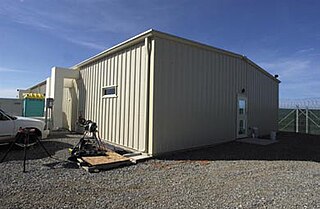
In addition to the regular camps for detainees held in extrajudicial detention there is a Guantanamo psychiatric ward at the Guantanamo Bay detention camp complex in Cuba. The Department of Defense announced the opening of the psychiatric facility in March 2003. Camp Commandant Geoffrey Miller denied that the opening of the psychiatric facility was solely in response to detainees' suicide attempts. Larry C. James was the chief psychologist in 2003.
Basin may refer to:
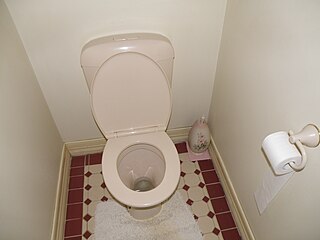
A toilet is a small room used for privately accessing the sanitation fixture (toilet) for urination and defecation. Toilet rooms often include a sink (basin) with soap/handwash for handwashing, as this is important for personal hygiene. These rooms are typically referred to as "half-bathrooms" in a private residence.

Camp Five Echo is a once secret "disciplinary block" built as part of the Guantanamo Bay detention camps, in Cuba. The press first reported on the existence of the camp in December 2011 when attorneys for Shaker Aamer, who had been held at the camp for extended periods of time, complained that conditions there were inhumane.

Open defecation is the human practice of defecating outside rather than into a toilet. People may choose fields, bushes, forests, ditches, streets, canals, or other open spaces for defecation. They do so either because they do not have a toilet readily accessible or due to traditional cultural practices. The practice is common where sanitation infrastructure and services are not available. Even if toilets are available, behavior change efforts may still be needed to promote the use of toilets. 'Open defecation free' (ODF) is a term used to describe communities that have shifted to using toilets instead of open defecation. This can happen, for example, after community-led total sanitation programs have been implemented.
References
- ↑ Toch, Hans (2008), "Essay: Punitiveness as "Behavior Management"", Criminal Justice and Behavior, 35 (3): 388–397, doi:10.1177/0093854807309427, S2CID 144441218
- ↑ Stephen A. Kurtz (2003), Analysis Behind Bars, Free Associations
- ↑ J Daskal (2008), Locked up alone: detention conditions and mental health at Guantanamo